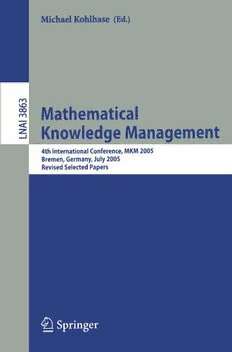
Mathematical Knowledge Management: 4th International Conference, MKM 2005, Bremen, Germany, July 15-17, 2005, Revised Selected Papers PDF
Preview Mathematical Knowledge Management: 4th International Conference, MKM 2005, Bremen, Germany, July 15-17, 2005, Revised Selected Papers
Lecture Notes in Artificial Intelligence 3863 EditedbyJ.G.CarbonellandJ.Siekmann Subseries of Lecture Notes in Computer Science Michael Kohlhase (Ed.) Mathematical Knowledge Management 4th International Conference, MKM 2005 Bremen, Germany, July 15-17, 2005 Revised Selected Papers 1 3 SeriesEditors JaimeG.Carbonell,CarnegieMellonUniversity,Pittsburgh,PA,USA JörgSiekmann,UniversityofSaarland,Saarbrücken,Germany VolumeEditor MichaelKohlhase InternationalUniversityBremen SchoolofEngineeringandScience CampusRing1,28758Bremen,Germany E-mail:[email protected] LibraryofCongressControlNumber:2006920149 CRSubjectClassification(1998):I.2,H.3,H.2.8,I.7.2,F.4.1,H.4,C.2.4,G.4,I.1 LNCSSublibrary:SL7–ArtificialIntelligence ISSN 0302-9743 ISBN-10 3-540-31430-XSpringerBerlinHeidelbergNewYork ISBN-13 978-3-540-31430-1SpringerBerlinHeidelbergNewYork Thisworkissubjecttocopyright.Allrightsarereserved,whetherthewholeorpartofthematerialis concerned,specificallytherightsoftranslation,reprinting,re-useofillustrations,recitation,broadcasting, reproductiononmicrofilmsorinanyotherway,andstorageindatabanks.Duplicationofthispublication orpartsthereofispermittedonlyundertheprovisionsoftheGermanCopyrightLawofSeptember9,1965, initscurrentversion,andpermissionforusemustalwaysbeobtainedfromSpringer.Violationsareliable toprosecutionundertheGermanCopyrightLaw. SpringerisapartofSpringerScience+BusinessMedia springer.com ©Springer-VerlagBerlinHeidelberg2006 PrintedinGermany Typesetting:Camera-readybyauthor,dataconversionbyScientificPublishingServices,Chennai,India Printedonacid-freepaper SPIN:11618027 06/3142 543210 Preface ThisvolumecontainstheproceedingsoftheFourthInternationalConferenceon MathematicalKnowledgeManagementMKM 2005held July 15–17,2005atIn- ternationalUniversityBremen,Germany.Previousconferenceshavebeenatthe ResearchInstitute for Symbolic Computation (RISC) Linz, Austria (September 2001), at Bertinoro, Italy (March 2003), and Bialowiecze, Poland (September 2004). Mathematicalknowledgemanagement(MKM)is afield inthe intersectionof mathematics and computer science, providing new techniques for managing the enormousvolume of mathematicalknowledgeavailable incurrentmathematical sources and making it available through the new developments in information technology. The annual MKM Conference brings together mathematicians, software de- velopers, publishing companies, math organizations, math users, and educators to exchange their views and approaches,current activities and new initiatives. For the first time, MKM 2005 chose to have post-conference proceedings, as otherwise the submission deadline would have collided with other conferences and crimped time since MKM 2004 in September 2004.The decision also facili- tatedkeepingtheconferenceopentonewideasaswellaskeepingupthematurity of the papers necessary for inclusion into archival proceedings. With a May 15 deadline,MKM2005received38submissions.Eachsubmissionwasreviewedby at least three programme committee members. The committee decided to ac- cept 27 papers for presentation at the conference. Out of these, 26 papers were acceptedforpublicationintheconferenceproceedingsafterre-evaluationbythe Programme Committee since they included significant improvements triggered by the referee reports and the discussions at the conference. As MKM is a small conference with a tightly knit community of authors, submissions by Programme Committee members were allowed: six submissions included committee members, but the review process was kept inaccessible to them.Onesubmissionwasco-authoredbytheProgramChair;itsreviewprocess was organized independently by Bill Farmer. The papers in this volume cover the whole area of mathematical knowl- edge management. Topics range from foundations and the representational and document-structure aspects of mathematical knowledge, over process questions like authoring, migration, and consistency management by automated theorem proving to applications in eLearning and case studies. IamgratefultoTomHalesforagreeingtogiveaninvitedtalkatMKM2005, to the Programme Committee, and the external reviewers for their excellent work and dedication to the MKM 2005 program. The work of the Programme Committee and the preparation of the proceedings were greatly simplified by Andrei Voronkov’s excellent EasyChairsystem. October 2005 Michael Kohlhase Conference Organization Programme Chair Michael Kohlhase, International University Bremen, Germany Programme Committee Andrew A. Adams, The University of Reading, UK Andrea Asperti, University of Bologna, Italy Richard Baraniuk, Rice University, USA Christoph Benzmu¨ller, Saarland University, Germany Olga Caprotti, University of Helsinki, Finland Mike Dewar, NAG, Ltd., UK William Farmer, McMaster University, Canada Tetsuo Ida, University of Tsukuba, Japan Fairouz Kamareddine, Heriott Watt University, UK Robert Miner, Design Science, USA Till Mossakowski,University of Bremen, Germany Andrzej Trybulec, University of Bialystok, Poland Stephen Watt, University Western Ontario, Canada Local Organization The localorganizationwascarriedoutbythe Conference Chairincollaboration withEvents4,aconferenceorganizationcompanyfoundedandoperatedby IUB students. External Reviewers Morten Andersen Arjeh Cohen Grzegorz Bancerek Armin Fiedler Rebhi Baraka Yukiyoshi Kameyama Marc Buckley Artur Kornilowicz Chad Brown Klaus Luettich Paul Cairns Christoph Lu¨th David Carlisle Mircea Marin VIII Organization Andreas Meier Krzysztof Prazmowski Yasuhiko Minamide Christoph Schwarzweller Immanuel Normann Andreas Strotmann Martijn Oostdijk Diedrich Wolter Matti Pauna Ju¨rgen Zimmer Martin Pollet Table of Contents Session I: Foundations A Proof-Theoretic Approach to Hierarchical Math Library Organization Kamal Aboul-Hosn, Terese Damhøj Andersen .................... 1 An Exploration in the Space of Mathematical Knowledge Andrea Kohlhase, Michael Kohlhase ............................. 17 Session II: Authoring Authoring Presentation for OpenMath Shahid Manzoor, Paul Libbrecht, Carsten Ullrich, Erica Melis ...... 33 Translating Mathematical Vernacular into Knowledge Repositories Adam Grabowski, Christoph Schwarzweller ....................... 49 Assisted Proof Document Authoring David Aspinall, Christoph Lu¨th, Burkhart Wolff .................. 65 Session III: Representations A Tough Nut for Mathematical Knowledge Management Manfred Kerber, Martin Pollet ................................. 81 Textbook Proofs Meet Formal Logic – The Problem of Underspecification and Granularity Serge Autexier, Armin Fiedler .................................. 96 Processing Textbook-Style Matrices Alan Sexton, Volker Sorge ..................................... 111 Session IV: Proving A Generic Modular Data Structure for Proof Attempts Alternating on Ideas and Granularity Serge Autexier, Christoph Benzmu¨ller, Dominik Dietrich, Andreas Meier, Claus-Peter Wirth .............................. 126 X Table of Contents Impasse-Driven Reasoning in Proof Planning Andreas Meier, Erica Melis .................................... 143 Literate Proving: Presenting and Documenting Formal Proofs Paul Cairns, Jeremy Gow...................................... 159 Session V: MKManagement Tools Semantic Matching for Mathematical Services William Naylor, Julian Padget ................................. 174 Mathematical Knowledge Browser with Automatic Hyperlink Detection Koji Nakagawa, Masakazu Suzuki ............................... 190 A Database of Glyphs for OCR of Mathematical Documents Alan Sexton, Volker Sorge ..................................... 203 Session VI: Documents Toward an Object-Oriented Structure for Mathematical Text Fairouz Kamareddine, Manuel Maarek, J.B. Wells ................ 217 Explanation in Natural Language of λ¯µµ˜-Terms Claudio Sacerdoti Coen ........................................ 234 Engineering Mathematical Knowledge Achim Mahnke, Jan Scheffczyk ................................. 250 Session VII: MKM Case Studies Computational Origami of a Morley’s Triangle Tetsuo Ida, Hidekazu Takahashi, Mircea Marin ................... 267 Designing Diagrammatic Catalogues of Types of Basic Interval Equation: A Case Study Zenon Kulpa ................................................. 283 Gro¨bner Bases — Theory Refinement in the Mizar System Christoph Schwarzweller ....................................... 299 Table of Contents XI Session VIII: Course Materials An Interactive Algebra Course with Formalised Proofs and Definitions Andrea Asperti, Herman Geuvers, Iris Loeb, Lionel Elie Mamane, Claudio Sacerdoti-Coen ..................... 315 Interactive Learning and Mathematical Calculus Arjeh M. Cohen, Hans Cuypers, Dorina Jibetean, Mark Spanbroek .............................................. 330 Session IX: Migration XML-izing Mizar: Making Semantic Processing and Presentation of MML Easy Josef Urban .................................................. 346 Determining Empirical Characteristics of Mathematical ExpressionUse Clare M. So, Stephen M. Watt ................................. 361 Transformations of MML Database’s Elements Robert Milewski .............................................. 376 Translating a Fragment of Weak Type Theory into Type Theory with Open Terms Gueorgui I. Jojgov ............................................ 389 Author Index.................................................. 405
